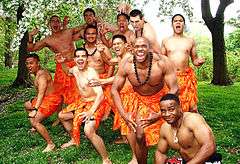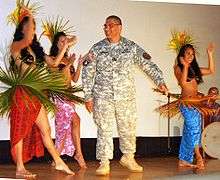Asian Pacific American Heritage Month
| Asian/Pacific American Heritage Month | |
|---|---|
 APAHM mine | |
| Observed by | United States |
| Date | May |
| Frequency | Annual |

Asian Pacific American Heritage Month (APAHM), now officially proclaimed Asian American and Pacific Islander Heritage Month,[1] takes place in May. It celebrates the culture, traditions, and history of Asian Americans and Pacific Islanders in the United States.
History
In June 1977 Reps. Frank Horton of New York and Norman Y. Mineta of California introduced a United States House of Representatives resolution to proclaim the first ten days of May as Asian-Pacific Heritage Week.[2][3][4] A similar bill was introduced in the Senate a month later by Daniel Inouye and Spark Matsunaga.[2] "The month of May was chosen to commemorate the immigration of the first Japanese to the United States on May 7, 1843, and to mark the anniversary of the completion of the transcontinental railroad on May 10, 1869. The majority of the workers who laid the tracks were Chinese immigrants."[2][5][6] President Jimmy Carter signed a joint resolution for the celebration on October 5, 1978.[2]
House Resolution 540
"A joint resolution authorizing the President to proclaim annually a week during the first 10 days in May as Pacific/Asian American Heritage Week." This resolution as well as Senate Joint Resolution 72 did not pass through however, did lead to the passing of Rep. Horton's House Joint Resolution 1007 which passed through both the House and the Senate and ultimately signed by President Jimmy Carter on October 5, 1978 to become Public Law 95-419. In 1990, George H.W. Bush signed a bill passed by Congress to extend Asian-American Heritage Week to a month;[7][8][9] May was officially designated as Asian-Pacific American Heritage Month two years later.[5][10][11][12] On May 1, 2009 President Obama issued a Presidential Proclamation which recalls the challenges faced by Asian Americans and Pacific Islanders and celebrates their great and significant contributions to our society.[13]
Medal of Honor Recipients
Philippine-American War
José B. Nísperos, PVT
Peacetime
Telesforo de la Crux Trinidad, Fireman 2nd Class (only Medal of Honor issued in peacetime).
World War II
Jose Calugas, SR, CPT Rudolph B. Davila, SSG Barney Fushimi Hajiro, PVT Mikio Hasemoto, PVT Joe J. Hayashi, SGT Shizuya Hayashi, PVT Daniel K. Inouye, 2LT Yeiki Kobashigawa, TSGT Robert T. Kuroda, SSG Kaoru Moto, PFC Sadao S. Munemori, PFC Kiyoshi k. Muranaga, PFC Masato Nakae, PVT Shinyei Nakamine, PVT William Kanzo Nakamura, PFC Joe M. Nishimoto, PFC Allan Masaharu Ohata, SGT James K. Okubo, TSGT Yukio Okutsu, TSGT Frank H. Ono, PFC Kazuo Otani, SSG George Taro "Joe" Sakato, PVT Ted "Tak" Tanouye, SGT Francis Brown Wai, CPT
Korean War
Hiroshi "Hershey" Miyamura, SSG Leroy A. Mendonca, SGT (youngest MOH recipient) Herbert K. Pilila'au, PFC Anthony T. Kaho'ohanohano, PFC
Vietnam War
Terry Teruo Kawamura, CPL Elmelindo Rodrigues Smith, SFC Rodney Jamus Takahashi Yano, SFC
Congressional Asian Pacific American Caucus
Co-Founded by Norman Y. Mineta on May 16, 1994, the caucus is made up of members of Congress from Asian and Pacific Islander descent or are advocates dedicated to the community, striving to promote well-being.
Purpose
"To ensure that legislation passed by the United States Congress, to the greatest extent possible, provides for the full participation of Asian Americans and Pacific Islanders and reflects the concerns and needs of the Asian American and Pacific Islander communities;
To educate other Members of Congress about the history, contributions and concerns of Asian American and Pacific Islanders;
To work with other Members and Caucuses to protect and advance the civil and constitutional rights of all Americans;
To establish policies on legislation and issues relating to persons of Asian and/or Pacific Islands ancestry who are citizens or nationals of, residents of, or immigrants to, the United States, its territories and possessions; and
To provide a structure to coordinate the efforts, and enhance the ability, of the Asian American and Pacific Islander Members of Congress to accomplish those goals."[14]
Culture
Traditions
Asian Pacific and Asian Americans of all ethnicities and languages come together to celebrate their heritage through many activities such as dancing, sharing traditional meals, observing and appreciating their rich history. Many more diverse beliefs and practices come with the already diversified Asian American community, with many different religions, traditions, and practices.
Icons
Asian American actors, actresses and celebrities play a major role in the adjusting to the American lifestyle. They start trends that their kinfolk alike begin to follow along like the kanji tattoo sported by former Seattle Mariners, American League Asian of the Year and Most Valuable Player Ichiro Suzuki. Furthermore, actresses like Lucy Liu take on major female roles in movies that send a message of hope and progress in Asian American eyes.
Events
During APAHM, communities celebrate the achievements and contributions of Asian and Pacific Americans with community festivals, government-sponsored activities and educational activities for students.[15]
Pan-Asian
- National Queer and Asian Conference,[16] first begun 2007
Northeast and East:
- Asian Pacific American Heritage Month Annual Gala hosted by the Asian Pacific American Institute for Congressional Studies in Washington, D.C.
- Asian-Pacific American Heritage Month at Altoona, PA's Penn State campus, first begun 2010
- Asian-Pacific American Heritage Month at Waltham, MA's Brandeis University campus, first became a month-long celebration in 2002
- Asian Pacific American Heritage Festival[17] in New York City, first begun 1981
- Silk Screen Asian American Film Festival[18] in Pittsburgh, Pennsylvania, first begun 2005
West Coast:
- Asian-Pacific Islander Heritage Month at Portland, Oregon's Lan Su Chinese Garden[19]
- Asian Cultural Festival of San Diego,[20] first begun 2009
- The Los Angeles Asian Pacific Film Festival,[21] first begun in 1983
- Pacific Rim Street Fest[22] in Sacramento, California, first begun in 1992
- Asian Pacific American Heritage Festival at the Oakland Asian Cultural Center in Chinatown, Oakland, California[23]
- Asian Heritage Street Celebration[24] in San Francisco
- Asian Pacific Islander Festival in Seattle, Washington[25]
- Asian Pacific American Heritage Month at Seattle, Washington's Wing Luke Asian Museum[26]
South and Southeast:
- Asian Kaleidoscope Month[27] at the University of Florida in Gainesville, Florida
- Asian Awareness Month at Florida State University in Tallahassee, Florida[28]
- Asian Festival[29] in Dallas, Texas, first begun 1990
- Asian Pacific American Heritage Festival[30] in Houston, Texas
Midwest:
- Asian Pacific American Heritage Month Celebration[31] at the University of Illinois's Urbana-Champaign campus
- [http:// Asian Festival, Columbus, www.asian-festival.org][32] in Columbus, Ohio, first begun in 1995 grown to be the largest Asian Festival in the Midwest with Fourteen ethnicity participation
- Cleveland Asian Festival[33] in Cleveland, Ohio, first begun in 2010
Specific nationalities
- Taiwanese American Cultural Festival[34] in San Francisco, first begun in 1992
See also
- Asian American
- Asian-Pacific American
- Pacific Islander
- List of commemorative days
- Other history months
- Filipino American History Month
- Black History Month
- African-American Music Appreciation Month
- Women's History Month
- LGBT History Month
- Heritage months
- Irish-American Heritage Month
- Jewish American Heritage Month
- National Hispanic Heritage Month
- Puerto Rican Heritage Month
- National Tibetan American Heritage Month
- Native American Indian Heritage Month
- Gay and Lesbian Pride Month
International:
- Black Awareness Day, Brazil
References
- ↑ http://www.presidency.ucsb.edu/ws/index.php?pid=86098
- 1 2 3 4 "About – Asian-Pacific American Heritage Month". asianpacificheritage.gov. Retrieved 2016-02-02.
- ↑ "Joint Resolution: Authorizing and requesting the President to proclaim the 7-day period beginning on May 4, 1979 as "Asian/Pacific American Heritage Week"" (PDF). Library of Congress. October 5, 1978. Retrieved July 18, 2012.
- ↑ Pub.L. 95–419
- 1 2 Pub.L. 102–450
- ↑ "Chinese Railroad Workers in North America Project". web.stanford.edu. Retrieved 2016-02-02.
- ↑ http://asianpacificheritage.gov/about.html
- ↑ Pub.L. 101–283
- ↑ "Joint Resolution: To designate May 1991 and May 1992 as "Asian/Pacific American Heritage Month"" (PDF). Library of Congress. May 14, 1991. Retrieved July 18, 2012.
- ↑ "Asian/Pacific American Heritage Month | Law Library of Congress". www.loc.gov. April 1, 2012. Retrieved 2016-02-02.
- ↑ "Asian/Pacific American Heritage Month". Law Library of Congress. Archived from the original on October 6, 2010. Retrieved 2010-09-07.
- ↑ "An Act: To designate May of each year as"Asian/Pacific American Heritage Month"" (PDF). Library of Congress. October 23, 1992. Retrieved July 18, 2012.
- ↑ "Presidential Proclamation 8369 of May 1, 2009" (PDF).
- ↑ "Purpose, Mission & Goals". Congressional Asian Pacific American Caucus (CAPAC), United States House of Representatives. Retrieved February 22, 2017.

- ↑ "Celebrate APA Heritage Month : Asian-Nation :: Asian American History, Demographics, & Issues". www.asian-nation.org. Retrieved 2016-02-02.
- ↑ "アリシアクリニック【口コミ・評判まとめ】". www.calqacon.com. Retrieved 2016-02-02.
- ↑ "Asian American and Pacific Islander Heritage Festival". www.capaonline.org. Retrieved 2016-02-02.
- ↑ "Sample Page". Silk Screen. Retrieved 2016-02-02.
- ↑ "Asian-Pacific American Heritage Month | Lan Su Chinese Garden". www.lansugarden.org. Retrieved 2016-02-02.
- ↑ "Asian Cultural Festival San Diego". www.asianculturalfestivalsd.com. Retrieved 2016-02-02.
- ↑ "Home". Los Angeles Asian Pacific Film Festival. Retrieved 2016-02-02.
- ↑ "Welcome to the 2015 Pacific Rim Street Festival Site!". www.pacificrimstreetfest.com. Retrieved 2016-02-02.
- ↑ "Festivals and Events | Oakland Asian Cultural Center". oacc.cc. Retrieved 2016-02-02.
- ↑ "Asian Heritage Street Celebration". www.asianfairsf.com. Retrieved 2016-02-02.
- ↑ "Live at Seattle Center". www.seattlecenter.com. Retrieved 2016-02-02.
- ↑ "Home > Wing Luke Museum". www.wingluke.org. Retrieved 2016-02-02.
- ↑ "Index of /". ufakmonth.com. Retrieved 2016-02-02.
- ↑ Government, Student. "Asian American Student Union". sga.fsu.edu. Retrieved 2016-02-02.
- ↑ "asian-festival-2015". asian-festival-2015. Retrieved 2016-02-02.
- ↑ "APAHA – Programs". www.apaha.org. Retrieved 2016-02-02.
- ↑ "AAPI Heritage Month Celebration | Asian American Cultural Center, University of Illinois at Urbana-Champaign". oiir.illinois.edu. Retrieved 2016-02-02.
- ↑ "2017 Columbus Asian Festival | Dragon Boat, May 21, 2017, Asian Festival 27 May, 10am to 7 pm and 28 May, 10am-6pm on 1755 E Broad Street, Columbus, Ohio, FREE Admission, FREE Parking, Free Health Screenings, Pets with organizer permission". asian-festival.org. Retrieved 2016-10-26.
- ↑ "2016 Cleveland Asian Festival | 21–22 May, 11am to 7 pm on Payne Ave. between E. 30th St & E. 27th St, FREE Admission, FREE Parking, No Pets". clevelandasianfestival.org. Retrieved 2016-02-02.
- ↑ "2014 | Taiwanese American Cultural Festival". tacf.tacl.org. Retrieved 2016-02-02.
https://www.congress.gov/search?q={%22source%22:%22legislation%22,%22search%22:%22hj+res+540%22,%22congress%22:95} http://asianpacificheritage.gov/about/ https://www.defense.gov/Portals/1/features/2016/0516_aapi/Asian_American_Pacific_Islander_Heritage_Month_2016_slide_3.pdf http://capac-chu.house.gov/about-me/purpose-mission-goals http://www.asian-nation.org/index.shtml